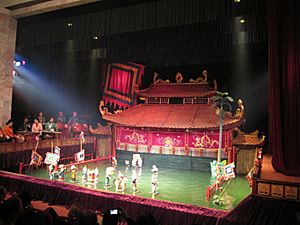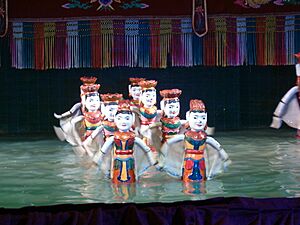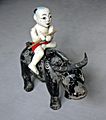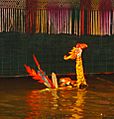Water puppetry facts for kids

Quick facts for kids Water puppetry |
|
| Vietnamese alphabet | Múa rối nước |
|---|---|
| Chữ Nôm | 𦨂𦇒渃 |
| Literal meaning | Making puppets dance (on) water |
Water puppetry (Vietnamese: Múa rối nước) is a special art form from Vietnam. It started a very long time ago, around the 11th century. This means it's about 900 years old! It began in small villages near the Red River Delta in northern Vietnam. Water puppetry is a unique type of puppet show that uses water as its stage.
The puppets are made from wood and then painted with a shiny coating called lacquer. The shows happen in a pool of water that is about waist-deep. Hidden puppeteers use long bamboo rods to control the puppets from under the water. This makes the puppets look like they are dancing right on top of the water! Long ago, when rice fields flooded, villagers would use this puppet play to entertain each other.
Contents
How Water Puppetry Works
Today, water puppet shows are performed in a pool of water that is about four meters (13 feet) wide. The surface of the water acts as the stage. You can see these shows in different places. Some are held on traditional village ponds. Others are in special pools built for traveling shows. Many are also in buildings made just for water puppetry.
Puppeteers and Their Secrets
Up to eight puppeteers stand behind a screen made of bamboo. This screen often looks like a beautiful temple. They control the puppets using long bamboo rods and strings. These tools are hidden under the water, so you can't see them! The puppets are carved from wood and can be quite heavy, sometimes weighing up to 15 kilograms (33 pounds).
The Water Stage
Long ago, the first water puppet festivals were held right in rice paddy fields. A small temple was built on top to hide the puppeteers, who stood in the waist-deep water. The water is very important. It acts as the stage for the puppets. It also reminds people of the rice harvest, which is important in Vietnam. The water also hides the puppet strings and the puppeteers' movements. Plus, it helps the music sound better and makes the stage shimmer with light.
Music and Storytelling
A traditional Vietnamese orchestra plays music during the show. The instruments include drums, wooden bells, cymbals, horns, a one-stringed instrument called a đàn bầu, gongs, and bamboo flutes. The gentle sound of a bamboo flute might play for a royal puppet. Loud drums and cymbals might announce a fire-breathing dragon!
Singers, who perform a type of opera called chèo, sing songs that tell the story. The musicians and puppets often interact. Musicians might shout a warning to a puppet in danger or cheer on a puppet that needs help. The puppets appear from the sides of the stage or rise from the water. Bright spotlights and colorful flags make the stage look festive.
What the Shows Are About
The stories in water puppetry are usually about life in the countryside of Vietnam. They often share Vietnamese folk tales that grandparents tell their grandchildren. You might see stories about harvesting rice, fishing, or village festivals.
Legends and important moments from Vietnam's history are also shown in short plays. Many of the skits, especially those about daily life, are very funny!
Meet Tễu
Chú Tễu is a very famous and important character in water puppetry. Chú means "uncle" or "boy" in Vietnamese. Tễu means "laugh" in an old Vietnamese language. He is a funny jester who often makes clever comments about society or even about leaders. He looks like a smiling boy and usually wears only a simple loincloth.
Gallery
See also
 In Spanish: Títeres acuáticos de Vietnam para niños
In Spanish: Títeres acuáticos de Vietnam para niños
 | Madam C. J. Walker |
 | Janet Emerson Bashen |
 | Annie Turnbo Malone |
 | Maggie L. Walker |














